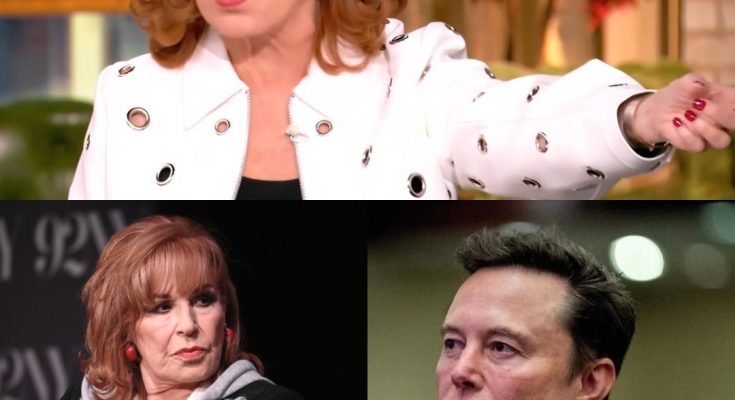In a surprising and assertive legal action, Elon Musk, the billionaire CEO of Tesla and SpaceX, has initiated a defamation lawsuit against Joy Behar and the widely viewed daytime talk show, The View. Musk is pursuing a substantial $70 million in damages, alleging that remarks made during a recent episode have harmed his reputation and inflicted considerable emotional distress. The lawsuit, lodged in a federal court in New York, arises amidst escalating tensions between Musk and Behar, along with other public figures who have openly criticized the tech mogul’s business practices and personal life. Musk, recognized for his candid demeanor on social media, has often been involved in public disputes with notable personalities, but this lawsuit marks one of his most significant legal confrontations to date.
The defamation lawsuit arises from remarks made by Joy Behar on The View during a conversation regarding Musk’s recent business choices, particularly his management of Twitter, now known as X. Behar, along with her co-hosts, was evaluating Musk’s leadership approach and his contentious public remarks when she commented on his character and conduct, which Musk claims were defamatory. In the discussion, Behar indicated that Musk’s leadership was harmful to both his businesses and the public, suggesting that his actions had adverse effects on employees, consumers, and the economy as a whole. Additionally, Behar touched upon Musk’s personal life, referencing his relationships and implying negative aspects of his character.
Musk’s legal representatives assert that these comments were not only false but also made with malicious intent. The lawsuit filed by Musk alleges that Behar’s statements aimed to deceive the public, damage his reputation, and jeopardize his business interests. Additionally, the lawsuit claims that the broadcast inflicted considerable harm on Musk’s personal and professional image, especially during a period when he faced significant challenges within his companies, including intense public scrutiny regarding his management of Twitter. Musk’s legal team, comprised of distinguished defamation lawyers, has presented a compelling case in their submission, arguing that Behar’s statements were not only untrue but also exhibited a reckless disregard for the truth.
The legal action requests $70 million in damages, which Musk’s attorneys contend represents the significant damage inflicted on Musk’s reputation and the financial repercussions for his enterprises. Besides pursuing financial restitution, the lawsuit also calls for The View and Joy Behar to publicly retract the defamatory remarks. Musk’s legal team asserts that such a retraction would aid in alleviating the harm caused by the broadcast and in restoring Musk’s standing, especially among the business sector and his vast social media audience.
Musk’s recent action is noteworthy not only due to the substantial financial amount involved but also as it reflects a wider strategy he has adopted in recent years—leveraging the legal system to counter what he views as unjust media criticism. Musk has participated in numerous prominent legal battles, including a recent case against British cave rescuer Vernon Unsworth, in which Musk emerged victorious. Currently, The View and Joy Behar have not provided an official response to Musk’s lawsuit.
The producers of the show have maintained a discreet silence, yet insiders from the production team have hinted at the preparation of a defense. Behar has not publicly addressed the lawsuit, although reports suggest that she and her fellow co-hosts are contemplating the legal implications of their remarks. The response from The View may influence public opinion regarding the case, given that the show has historically served as a forum for political and cultural discourse. Behar, recognized for her liberal stance and candid demeanor, has often engaged in contentious debates, frequently confronting conservative figures such as Musk. This lawsuit, however, could represent a pivotal moment, particularly as it involves a public figure with considerable legal resources. Elon Musk has consistently been a divisive personality, garnering both fervent admiration and criticism from the public. As the CEO of Tesla and SpaceX, Musk has established himself as an innovative entrepreneur who challenges the limits of technology and space exploration.
Nevertheless, his public image has frequently been tainted by provocative statements and actions, especially on social media. Musk’s active presence on Twitter (now X) has resulted in both accolades and backlash, with his tweets known to influence markets, ignite discussions, and even provoke legal repercussions.
His engagements with the media, particularly following his $44 billion acquisition of Twitter, have subjected him to significant examination. Musk has often had confrontations with journalists, accusing them of partiality and disseminating false information. Given this background, Musk’s choice to initiate a defamation lawsuit against The View and Joy Behar is unsurprising to those who monitor his professional journey.
He has demonstrated a readiness to counter what he perceives as unwarranted assaults on his reputation, particularly when such criticisms originate from the media. This lawsuit exemplifies Musk’s use of legal avenues to protect his public persona and secure his business interests.
Furthermore, the lawsuit prompts considerations regarding the wider implications for The View and its capacity to uphold free speech. The talk show, which has been broadcasting for many years, is recognized for its vibrant discussions and occasionally heated debates.
Although The View has established itself as a platform for discussing contemporary issues, celebrity news, and political matters, it has also encountered criticism for its occasionally contentious remarks. The legal action initiated by Musk may have profound implications for the program. Defamation lawsuits against media organizations and public personalities are not rare; however, the prominence of this particular case could compel The View to reassess its commentary strategy, especially regarding influential figures like Musk.
This situation may lead to a shift in the nature of the show’s discussions, as hosts might adopt a more cautious approach in their statements to mitigate the risk of future legal disputes. Musk’s lawsuit underscores a rising trend in the digital era, where public figures increasingly resort to legal avenues to protect their reputations. The proliferation of social media and the continuous news cycle have facilitated a landscape where individuals and organizations are more vulnerable to public scrutiny, misinformation, and defamation.
Consequently, numerous prominent individuals are pursuing legal action to address perceived harm to their reputations. Musk’s lawsuit exemplifies a larger trend in which both individuals and corporations are utilizing defamation claims as a means to counteract what they consider unjust treatment by the media. These legal actions could significantly influence how media organizations handle delicate topics and public personalities, particularly when the financial implications are as substantial as in Musk’s situation.
Elon Musk’s defamation suit against Joy Behar and The View marks a pivotal point in the ongoing conflict between public figures and the media. Musk is demanding $70 million in damages, a public retraction, and the rehabilitation of his reputation in response to what he alleges are malicious and false remarks made by Behar on the widely viewed talk show.
Although the result of the lawsuit is still unknown, it underscores the growing readiness of prominent individuals to resort to legal action in response to what they view as media assaults. This case also prompts significant inquiries regarding the media’s influence on public perception and the legal limits of free expression.
As Musk persists in managing his public image, this lawsuit could represent a pivotal point in his continuing conflict with the media, potentially affecting the dynamics between public figures and the press in the era of digital communication.



